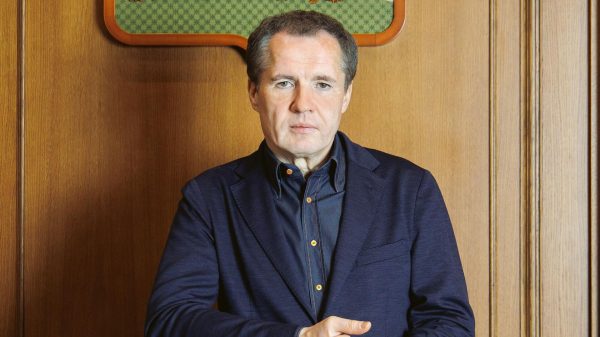 Patrick Swayze (right) with Marshall Teague in Road House Photo: Alamy
Patrick Swayze (right) with Marshall Teague in Road House Photo: Alamy
The Road House team can't come to a consensus on how many nights Patrick Swayze and Marshall R. Teague — Swayze's on-screen enemy (who became best friend in real life) — spent fighting to the death. Director Rowdy Herrington believes they fought for two nights. Stunt and fight choreographer Charlie Picerni remembers only one. Teague himself, a former US Navy member and NATO kickboxing champion, says he and Swayze did it for a total of five nights. “Five nights, five and a half hours a night,” Teague explains. “We set up cameras and all we did was fight. We fought this battle 72 times.”
In Road House, Swayze plays the absurdly named Dalton, a dour and philosophizing bouncer (“Pain Don't Hurt”) hired to take down the Double Deuce, the roughest, toughest honkytonk in Jasper, Missouri. . It's a small town with a big problem with troublemakers, and Dalton soon finds himself confronted by local villains. And what a magnificent mane he has. “That hair became the bane of existence,” Swayze later said. “One day people started saying that Swayze invented the mullet.”
The biggest battle comes when Dalton faces off against the city's most sadistic henchman Jimmy (played by Teague) in a moonlight showdown on the riverbank. Crackling with homoerotic tension: “I used to fuck guys like you in prison!” Jimmy's boast is one of the greatest fights in cinema, ending with an incredible fatal shot as Dalton rips Jimmy's throat out with his bare hands — one of the many, many incredible moments that make Road House such a spectacle of joyful, ridiculous, ultra-violent man-movie cinema.
It seems absolutely right that no one agrees with how the fight ended. It has earned a cult status in its own right, based on a number of seemingly true but apocryphal stories: that Swayze and Teague beat each other up for real, forcing the team to intervene; that the cutting of the throat was caused by an actual incident; and, best of all, a gaggle of women obsessed with Dirty Dancing floated up the river to catch a glimpse of Swayze. 
Just as Dalton wanders the country, dealing with troubles and creating a double myth, Road House, which was trashed by critics back in 1989, exists in a constant, almost legendary state. Not only on television (they say it is constantly shown somewhere, on some channel), but also in the male psyche, where it has become a symbol of the basest male pleasures: fights, boobs, swearing, beer, explosions. Starring Swayze, one of the greatest examples of cinematic masculinity: dancer, athlete, martial artist, dreamboat and true Texas cowboy.
Now the remake starring Jake Gyllenhaal is coming to Prime Video, following a difficult path to the small screen. Director Doug Liman boycotted the SXSW screening in protest of the film going straight to air, and fiery super-producer Joel Silver, who also produced the original, quit. Some reports said he was fired, although Silver's representatives denied this. Meanwhile, original screenplay writer R. Lance Hill has filed a lawsuit alleging that artificial intelligence was used to complete the film during the SAG-AFTRA strike, which Amazon MGM denies.
The new film reimagines Dalton as a former MMA fighter and pits him against real-life UFC bad boy Conor McGregor. But is Road House 2024 cool enough to be so ridiculous that it tops the original? “I wish the best, I really do,” Teague says of the remake. «If they can last 36 years, that's good for them…»
Looking back, Rowdy Herrington admits he didn't want to create the original Road House. “It was so broad,” he says of the script, written by R. Lance Hill (as David Lee Henry) and Hilary Henkin. It was all right there on the page: the nudity, the violence, the ridiculousness. Joel Silver boasted that he made films for 13-year-old boys and introduced Road House to new actors as just «boobs and bombs.»
Of course, Road House is ridiculous from the start. A few minutes after we meet Dalton, he is stitching up a knife wound in his shoulder. He has a widespread reputation as «the best damn tough guy in the business» (by «tough» apparently meaning the head bouncer). Dalton is so famous for his skills at kicking people out of clubs that he only needs one name — like Prince, Bono or Madonna. As the story goes, he once tore a man's throat, for which he still bears the guilt.
 Jake Gyllenhaal and Conor McGregor in the remake of «Road House»
Jake Gyllenhaal and Conor McGregor in the remake of «Road House»
The absurdity continues: when Dalton is hired to clean the Double Deuce, he demands $5,000 up front and $500 per night (that's about $1,250 in 2024)—probably more than half of the Double Deuce's revenue. Not to mention the thousands of dollars the bar has to lose due to broken furniture and glasses every night when fights break out like clockwork. According to the bar's resident bluesman (played by blind guitarist Geoff Healy), Double Deuce is «the place to dry your eyes after closing time.» It's also a place where women happily strip in front of drunken hound dogs (a common cause of bar fights) and the talk of fighting is colorful. — What's wrong with you, chicken? — asks one troublemaker with a knife.
Herrington may have been reluctant, but Road House was one step away from the studio door. And Joel Silver had a blast making money-making action films filled with grit, testosterone and high-octane moments: 48 Hours, Commando, Predator, Lethal Weapon and Die Hard. In retrospect, Road House's energetic machismo played into Silver's reputation as a larger-than-life personality known for his wild spending and industry-shaking temper tantrums. Sylvester Stallone claimed to have seen Silver «cut someone's hair off» with his scream.
«Joel was a maniac in every movie,» laughs Charlie Picerni, who worked on a number of Silver productions, including Toughie». «But I loved him because he made things interesting.» Picerni adds: “Joel was a character, there’s no doubt about it. If everything went well, he loved everyone. If things don't go well, you're done.»
Silver convinced Herrington to make Road House and advised him not to worry about any critical reaction. “They'll blame me,” Silver reassured him.
“I told Joel the script needed work,” Herrington says. “There was some really crazy shit going on there. Really crazy. (One of the frequently circulated legends about Road House concerns the castration scene, which Herrington refused to film.)
 ' If that's the best punch you've got, this movie is going to suck.»: Patrick Swayze in Road House Photo: Alamy
' If that's the best punch you've got, this movie is going to suck.»: Patrick Swayze in Road House Photo: Alamy
Silver also got Kelly Lynch to co-star in Road House. As Lynch recalled in a 2012 interview, Silver told her, “I don’t create art, I buy it,” and promised that Road House would be “the best driving movie ever made.” He then reminded Lynch that she had a studio contract, so ultimately she had no choice.
On the other hand, aspiring actress (and now stuntwoman) Julie Michaels was cast as Denise, a double D. siren and gangster's girlfriend, pandering to Silver's ego. Michaels was only 19 years old, and at the suggestion of her agent, she wrote “property of Joel Silver” on her thigh and showed it during a dance audition.
Meanwhile, Swayze catapulted his way to superstardom with 1987's Dirty Dancing. «I thought I had prepared myself for this success,» he said after Dirty Dancing's $214 million box office haul. “I had been dealing with a certain amount of fame for six years now, so I felt like I knew the ropes. But I didn’t know anything.”
In an effort to move away from the heartthrob image, Swayze turned down what he called «crotch-first» roles. He wanted to do something macho — an action movie to show off his skills in dealing with aggression. “I better have fun doing whatever physical films I want to make before my knees give out,” he said. (Swayze had suffered from knee problems for years, and had to have his knee drained twice while filming Road House's river battle.) «Plus, I kind of like it,» Swayze said of the film, «I'm from Texas and all that.» «.
Swayze trained for Road House with Charlie Picerni and Benny «Jet» Urquidez, the legendary kickboxing champion (Urquidez can be seen trading blows with John Cusack in Grosse Pointe Blanc, another of the greatest fights in cinema). Urquidez was impressed by Swayze's martial arts skills. “Benny really wanted me to start competing,” Swayze later said. “I wanted me to do kickboxing.”

Picerni was one of several heavy hitters behind the camera. “A top-notch stuntman,” Herrington says. Indeed, Road House was superior to its competitors in terms of its crew, including editor Frank J. Urioste (RoboCop, Die Hard)—“One of the greatest editors of all time,” says Herrington—and cinematographer Dean Cundey ( “The Thing”, “Who Framed Roger Rabbit”, “Jurassic Park”). The cast and crew knew what Roadhouse was all about. “They call this movie a guilty pleasure,” Herrington says. “We all know better, but we laugh about it. We knew we were doing this. We were not naive in this regard.”
“None of us thought we were going to make Gone with the Wind,” Teague says. «We're not looking at an award-winning picture here.»
At Road House, the stakes are surprisingly low. Dalton just needs to stop a few bar fights (which he does by starting a lot of bar fights). Meanwhile, local kingpin Brad Wesley (the rambunctious Ben Gazzara) exerts his influence over the town, threatening to demand money from a poor mechanic and swerving onto the road whenever he needs a laugh. Ultimately, Dalton gets on the bad side of the villains because he doesn't let them get drunk, have sex in the warehouse, or enjoy a good old handjob whenever they want.
The most interesting thing about Road House is how it escalates into monster truck carnage, real-life murders, and explosions so big that Herrington thinks the film's special effects coordinator «would be in jail for arson if he I wasn’t in the film business.” The collateral damage includes Dalton's best friend—also brilliantly named Wade Garrett (Sam Elliott), a lanky, battle-hardened mentor—who gets stabbed in the chest for his troubles. Sam Elliott didn't want to sign either, so Herrington had to resort to some persuasion of his own, much like Joel Silver. He met with Elliot and begged: “Sam, if you don’t do this movie, I’m done!”
For Herrington, Road House was both a cartoon and a modern Western. Dalton is a new gunslinger who has come to town to take down a crooked sheriff. In Dalton's case, he drives into town in his flashy Mercedes. In fact, he refuses to take the plane to Missouri. «I don't fly, it's too dangerous,» says Dalton, a man who has had so many fights that he carries his medical records with him. Dalton's «I don't fly» mantra is just one of his many worldly lessons or life rules to follow—macho one-liners disguised as philosophical teachings. Other plugs include the phrase «no one ever wins in a fight» and — an absolute classic — «pain does no harm.» «Wounded Warrior»: Patrick Swayze in «Road House»
Dalton is a spiritual guy, which he proves by doing tai chi in his outerwear, and one of the few '80s action heroes with a degree in philosophy. The character reflected Swayze's own worldview. “I really believe in the concept of the peaceful warrior,” Swayze said of Dalton. “However, I am very clear that we must be trained to protect our world.” Dalton is so cruel that it hurts him, a pacifist heart tormented by his penchant for tearing out tracheas. He has to overcome the horror of killing a person, knocking the stuffing out of the load even more. The character stands alongside Swayze's other alpha types: the lost lover Johnny Castle in Dirty Dancing and the bromantic adrenaline junkie Bodhi in Point Break.
The ladies at Road House are certainly impressed by Dalton's wounded warrior manner. Denise (Julie Michaels), smothered by Dalton from the second she saw him, performs an impromptu striptease for him. This is the type of casual nudity that doesn't appear in mainstream films anymore — not since sex coordinators were standard practice. “I think I was probably more awkward than the girls,” Herrington says of the nude shoot. “Is this exploitation? On some level it definitely is,” he admits. “That was part of what the whole movie was about.”
Unfortunately, Julie Michaels' boyfriend committed suicide the day before they filmed her striptease, and she still got up and performed it.
The famous sex scene in Road House takes place between Kelly Lynch and Swayze, standing in jeans and pressed against a stone wall. Swayze worked the scene with his wife Lisa Niemi and described it as «probably the hottest thing I've ever done, and the clothes don't even come off.» This scene is also the origin of the funny Road House codephrase. Whenever Bill Murray or one of his brothers watch Road House on TV, they call Lynch's husband, Mitch Glaser, and taunt him over the phone about it. “Kelly is having sex with Patrick Swayze now,” Murray said. “They do it. He throws her against the rocks.” One day Murray called from Russia, as if to prove that the Road House is always there somewhere.
 Patrick Swayze and Kelly Lynch Road House Credit: Alamy
Patrick Swayze and Kelly Lynch Road House Credit: Alamy
When Herrington first read the script, he worried that the script's many vulgarities would actually put women off—sexist fools like, «What do you say you and I are touching nipple to nipple?» This is probably the least successful line of communication in the world. (Herrington tried to cut out some of the rougher lines during editing, but discovered they would be reinserted when the film hit theaters.) But Swayze's sex appeal was unwavering. Trucks filled with women appeared on film sets, lusting after Swayze after Dirty Dancing. “Women throw themselves at my feet all the time, some of them the most beautiful women you could ever want to meet,” Swayze said in a 1988 interview. “Older women are the worst. They placed their hands directly on my ass. Then I hear them say, “I did it, Myrtle, I did it!”
Herrington experienced this firsthand when they filmed the film in Fresno. “Patrick had a mobile home down the street,” he recalls. “He came out and there was a crowd of girls there. It was like Elvis! They tried to tear off his clothes. Tim Moore [executive producer] and I had to step in and push them away. Patrick was terrified. He became famous almost instantly. The girls were crazy about him… the mixture of a truly masculine man who can dance is very attractive to women. They see his sensitivity and strength.»
In «Double Deuce,» Dalton's unbridled sexuality seems to attract the attention of the villains, too. It's easy to see elements of the mannerisms 35 years later, although Marshall Teague's Jimmy—with his crucifix earring and impeccably coiffed hair—has a sadistic but sexually charged attraction to Dalton. “You’re… mine,” Jimmy grins.
As Road House legend goes, there was something of a rift between Swayze and Teague—a method-like tension that emanated from their characters. Herrington recalls seeing Swayze and Teague «snarling at each other» at dinner. Teague says crew members heard enough of what he had to say about Swayze and told Teague to «tick him off» to give their upcoming fight an extra edge. «I said, 'I can do this, I can piss him off,'» Teague says. “Were we growling at each other? Yeah. Did this really happen? Yes, it was.”
Teague insists the actual fight was as real as it gets. When they first got together, Swayze kicked him in the stomach, which Teague shrugged off. “I said, 'If this is the best punch you've got, this movie is going to suck,'” Teague recalls. «With his next punch, I moved back a little, grabbed his leg, pushed it down and said, 'Damn it, bring it!' Here we stopped growling. He stood up and didn't say a word other than «roll camera.» We got back to him and he kicked me so hard that I left the ground and bounced on my butt, rolling back about 10 feet. I said, «This is a cool dude.» He looked at me and said, «You like that shit, don't you?» I said, «No, I like this shit!»Swayze put his hand on Teague's shoulder and said, “What do you say, we're not fooling the public? » As Swayze explained about the big fight: «When we kick each other, we literally lift each other off the ground, but have enough control not to break any bones.»
«It was definitely real enough to be convincing team,” Teague says. “We started this fight and it got so brutal that the next thing I know, the whole team — Joel Silver, everyone — was on top of us and pinned us to the ground. They said: “Stop it, guys!” You are killing each other!” We try to spit out sand and say: “Leave us alone, we are trying to arrange this fight for you!”
The fight was choreographed by Charlie Picerni, who also served as the second unit director. For Picerni, the key to creating great movie fights is motivating the characters—getting them to perform moves that would make sense if the fight were happening in real life—which he did, drawing on real-life experience. “I don't just put on a fight to make it look good for Hollywood,” he says. “I stage the struggle for the situations the character is in. I've been in a lot of situations in my life and luckily I got out of them — I put that in my films.» He adds: “You have to have the motivation to put yourself in that situation. «What would I do?» Just like an actor in a dramatic role.”
It's a noisy battle. No shuttlecocks, no bullet time. Just a couple of alphas doing it. “The reason the fight went so well is because I had two guys who were very coordinated,” Picerni said. “They came up with a few moves that I incorporated into the fight and it all came together. Usually I have to get D's. But Patrick knew what he was doing, and Marshall was a martial artist. Thanks to what they knew, everything turned out much easier.”
At one point, Teague grabbed a log and cracked it into Swayze's ribs. Swayze later admitted he made the mistake of going topless for the fight — because he couldn't wear any padding — and the most time-consuming aspect was covering up the bruises on his body. “Our chests were black,” Teague says. «Our feet were black.»
 Patrick Swayze in a house on the road. Photo: Alamy
Patrick Swayze in a house on the road. Photo: Alamy
There is some debate about who coined Jimmy's line «I used to fuck guys like you in prison!» line. Teague once stated that he came up with it, although others said Joel Silver. Tig is happy to oblige. He can believe it could be Silver. «Joel was on his phone screaming, 'Say it!' — Tig laughs.
It's fitting that in one of the most courageous films of all time, hand-to-hand combat became the bonding moment between Swayze and Teague. “We were so exhausted last night that we were leaning on each other,” Teague says. «He whispered, 'Are you willing to have one more?' I said, “Yes, are you?” It was a wonderful moment.» They remained close friends until Swayze died in 2009.
The actual throat-cutting—a move that Dalton has to refuse because it's kill or be killed—came from Herrington. “My college roommate had a friend who did martial arts,” he says. “My roommate told me he was attacked and he did this thing by ripping out the guy's windpipe. I suggested it and it went into the script.”
Both Teague and Picerni agree that, as extreme as it may seem, it is possible. “It’s too much,” says Picerni, “but a guy who’s really into martial arts can do it. They could rip your throat out.”
Tig remembers that they had to get the picture quickly because the sun was rising. Applying the makeup to his throat only took twelve minutes, and they did it in one take. “It all came down to choreography,” Teague says. “Boom, boom, boom – grab me, spank me, tear me out and kick me into the water.” To this day, Road House fans always check Tig's throat to make sure it's intact.

Test screenings of Road House were so positive that the film's release was delayed several months. It arrived in theaters on May 19, 1989. Reviews were brutal—“noisy, dirty, implausible,” as one American critic wrote—and the US box office was modest, taking in $30 million domestically. When the producers of Phantom were considering Swayze for the role of Phantom, they watched Road House. After the credits rolled, director Jerry Zucker announced, «There is no way on God's green earth that Patrick Swayze will ever star in this movie!» «They were lucky to have him,» Herrington says, quite rightly.
Road House gained its cult popularity on VHS and through endless television reruns. “Someone told me there was an article in Playboy that said we had broken the record for most TV shows,” Herrington says.
Thirty-five years later, Road House is considered so bad it's good. Even Kelly Lynch called it «the best and worst movie ever made.» This downplays its cultural damage. Road House is a film about hyper-masculinity, one of the last stops on the way out of 1980s action and all its excesses. The 2024 version will be talked about 35 years from now as a classic of masculinity.
“It's like a sequel to Die Hard,” says Charlie Picerni. “Or look at all the Rockies they made. It has never been as good as the first one.”

























































Свежие комментарии